Braintree, the Chicago-based payments gateway that’s now processing over $10 billion in payments annually, including those for startups like Uber, Fab, Hailo, Airbnb, Rovio and others, is today expanding on last summer’s acquisition of payments service Venmo through a new partnership with online banking platform Simple. The banking provider will integrate with Venmo Touch, a service that allows users to store their credit card data in Braintree’s network in order to facilitate one-touch payments with Braintree partners.
Starting today, Braintree is making Venmo Touch available for the first time to banks and card issuers. The service was previously available to app makers, having initially launched with companies like HotelTonight, TaskRabbit and Wrapp.
The integration in Simple, though being announced this morning, is still a few weeks out from going live with the banking startup. But soon, customers will be about to opt-in to the service, which will then enable one-touch purchases across Braintree’s network of apps.
This one-touch service exited from a closed beta this April, offering users a better checkout flow in supported applications. Instead of having to re-enter in their credit card info every time they signed up for a new mobile app that’s Braintree-powered, Venmo Touch will allow consumers to save their credit card info on the network and then retrieve it.
For end users, the process of doing so isn’t all that different from what something like Google Wallet has introduced – you add your credit card, and then can use it again and again on services where Wallet is accepted. Google, too, is making a play for users’ payment activity on mobile – yesterday, for example, it incentivized users to “shop and save” with popular Android apps and mobile websites where “Buy With Google” is enabled.
Though Google’s and Braintree’s services are different – one is a wallet, the other a payments gateway – the end goal is essentially the same: get customers to store their credit card info with the platform. Once saved, customers will generally avoid the hassle of choosing another means of payment – like, say, PayPal, for example. They’ll continue to use whatever offers the least amount of friction and minimal typing, especially when it comes the painstaking entry process on mobile’s tiny screens and keyboards. And as the users turn to the easier way to transact, the platform holding their data continues to grow.
Though Braintree is only announcing a partnership with Simple today, what Braintree really needs now is to get bank card issuers on board, too. The major credit card comapnies Visa, MasterCard, and Amex, however, have been building out their own mobile technologies and digital wallet applications, which also allow customers to store payment info in virtual online lockers of sorts, then quickly roll through checkout with supported merchants. Though not necessarily “mobile wallets,” these digital services could be housed in a mobile app interface.
For consumers, the payments landscape is still a confusing one – and in particular, it’s confusing on mobile. At the end of the day, users will adopt whichever technology is most widely available to them on the services they use most.
Braintree, whose $10 billion in annual payments is riding up close on the heels of PayPal mobile’s $14 billion in 2012, now has a horse in that race.
